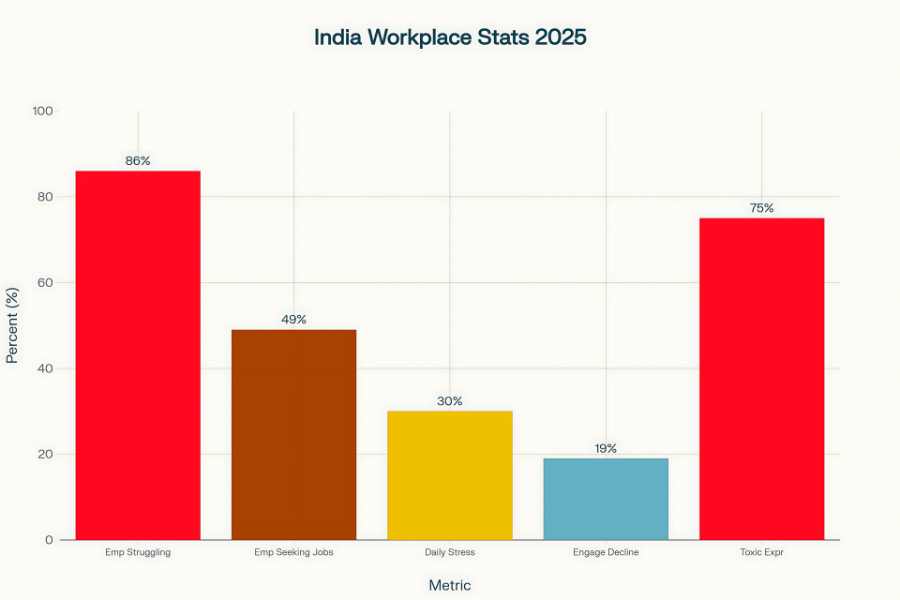
A manager’s taunt—“You’re easily replaceable”—ignited a viral India story when an employee’s bold resignation sparked a nationwide workplace revolution. With 86% of Indian workers struggling and ₹1.1 lakh crore lost to stress (India trends 2025), this latest Indian discovery unveils Gen Z’s “revenge quitting” and a cultural shift. From toxic bosses to legal awakening.
The story begins with eight words that have become the battle cry of India’s workforce revolution: “Tumhare jaise log replace karna mushkil nahi” (It’s not difficult to replace people like you). This dismissive taunt, allegedly uttered by a manager to their subordinate, sparked what would become one of 2025’s most viral workplace stories.
What happened next transformed this employee from victim to victor in a matter of hours. The very next morning, the employee placed a resignation letter on their boss’s desk with an equally powerful response: “Best of luck, ek mahine mein replacement dhoondh lo” (Find a replacement in one month).
The aftermath was swift and shocking. Within two hours, HR called with a counteroffer. The moment of truth had arrived—sometimes the real power lies in walking away.
India’s Workplace Crisis: The Numbers Don’t Lie
This viral resignation story isn’t an isolated incident but rather a symptom of a much larger crisis plaguing Indian workplaces. The statistics paint a disturbing picture of the current state of employee well-being across the nation.

According to the latest India trends 2025 data, a staggering 86% of Indian employees are struggling or suffering at work, while 49% are actively seeking new jobs. The Gallup State of the Global Workplace 2025 report reveals that workplace engagement in India has plummeted to just 19% in 2025, down from 24% in 2024—marking the steepest decline globally.
The human cost is equally alarming. 30% of Indian workers experience daily stress, and an overwhelming 75% report having worked in toxic environments. These aren’t just numbers—they represent millions of professionals whose lives are being fundamentally altered by workplace toxicity.
The Anatomy of Toxic Leadership: When Bosses Cross the Line
The phrase “easily replaceable” has become a weapon wielded by toxic managers to erode confidence and enforce compliance. This psychological manipulation creates a culture of fear, where employees feel expendable and powerless. Viral India stories in 2025 exposed the devastating impact of such leadership.
In Bengaluru, a startup employee was hospitalized after a panic attack triggered by months of verbal abuse from their CEO. The story, which exploded on Reddit, underscored how non-technical leaders often impose unrealistic deadlines while micromanaging skilled professionals.
Another employee recounted their resignation, where their manager accused them of “collusion” after a colleague also quit, escalating to verbal attacks and sudden termination. These incidents reveal how toxic leaders react with aggression when their authority is challenged, fueling the India workplace revolution.
The Great Awakening: Gen Z’s Workplace Revolution
The current workplace upheaval is largely driven by India’s youngest professionals, who refuse to accept the toxic conditions that previous generations endured. Gen Z workers are leading what experts call “revenge quitting”—dramatic resignations that serve as both exit strategies and statements against toxic workplace cultures.
This generational shift is fundamentally changing workplace dynamics. Gen Z professionals prioritize roles that align with their values, foster belonging, and offer inclusive environments. They’re willing to walk away from positions that don’t meet these standards, creating unprecedented leverage in employer-employee relationships.
The numbers support this trend. Young Indians are struggling at work more than any other demographic, with many citing toxic bosses as their primary reason for resigning. This has forced organizations to reconsider their management approaches or face continuous talent drain.
The Impact of India’s 2024 Budget on the Middle-Class Monthly Budget
Why Aren’t You Getting Promoted? Uncover India’s Hidden Workplace Barriers
Why ManipalCigna ProHealth’s High Sum Insured Boosts Your Financial Security
Hidden GSTN Update: How to Beat ‘Schema Validation Failed’ in GSTR-7 Filing
The Economic Tsunami: When Toxicity Costs Billions
The financial implications of India's toxic workplace culture are staggering. Workplace stress alone is costing India ₹1.1 lakh crore annually, while the broader economic impact of disengagement and turnover reaches unprecedented levels.
Organizations are discovering that the cost of replacing employees far exceeds the investment required to create healthy work environments. The viral resignation stories of 2025 have highlighted this reality, with companies scrambling to retain talent through counteroffers that often come too late.
Latest Indian discoveries in workplace psychology reveal that toxic environments don't just affect individual employees—they create systemic failures that impact productivity, innovation, and long-term sustainability.
Legal Awakening: Employee Rights in the Spotlight
India's evolving legal landscape is providing new protections for workers facing workplace harassment. The new Labour Codes of 2025 are streamlining employee rights and creating clearer frameworks for addressing toxic behavior.
Mental harassment at the workplace is now being recognized under various sections of the Indian Penal Code, including criminal intimidation (Section 506) and wrongful confinement (Section 340). The Constitution's Article 21, which guarantees the right to life with dignity, is increasingly being interpreted to include workplace dignity.
Progressive organizations are implementing comprehensive anti-harassment policies that go beyond legal compliance to create genuinely safe work environments. This shift represents a fundamental change in how Indian companies approach employee welfare and workplace culture.
The Viral Victory: When Walking Away Becomes Winning
The power of the viral resignation lies not just in the individual's courage but in its broader symbolism. When the employee in the viral story received that HR call within two hours, it demonstrated a universal truth: organizations often don't realize an employee's value until they're gone.
This phenomenon is reshaping power dynamics across Indian workplaces. Employees are discovering that their skills and contributions hold more value than toxic managers would have them believe. The resignation letter becomes a mirror, reflecting the manager's insecurities and the organization's dependence on individual contributors.
Social media responses to these viral stories reveal a collective awakening. Comments pour in from professionals sharing similar experiences, creating a community of support and validation that empowers others to take similar stands.
The Counteroffensive: When Companies Panic
The immediate HR response in the viral resignation story represents a broader trend occurring across Indian organizations. Companies are realizing that toxic management styles are unsustainable in today's competitive talent market.
However, experts warn against accepting counteroffers from toxic environments. As one social media comment noted: "A manager should realize the value of an employee, not after they resign. They just wanted to squeeze the maximum out of you by gaslighting, low-balling and making you underestimate your worth".
The most concerning aspect of these counteroffers is that they often represent temporary fixes rather than systemic changes. Organizations may offer higher compensation or better terms to retain talent while failing to address the underlying toxic culture that prompted the resignation.
The Ripple Effect: How One Story Sparked a Movement
The viral nature of workplace resignation stories in 2025 has created what sociologists call "collective courage"—when individual acts of bravery inspire others to take similar stands. Each shared story becomes a beacon for others trapped in toxic situations.
Social media trends in India 2025 show that workplace stories are among the most engaging content, with millions of shares, comments, and reactions. These stories resonate because they reflect shared experiences of workplace toxicity that many have endured in silence.
The democratizing power of social media has given employees a platform to expose toxic behavior and seek support from wider communities. This transparency is forcing organizations to be more accountable for their workplace cultures.
The New Workplace Paradigm: What Victory Looks Like
The most successful organizations of 2025 are those that have proactively addressed toxic culture rather than waiting for viral resignations to force change. Progressive companies are implementing mental health support systems, promoting genuine work-life balance, and ensuring fair treatment for all employees.
India's HR revolution in 2025 is characterized by agile strategies that prioritize employee well-being over traditional power structures. Companies like Infosys have implemented automated warnings when employees exceed standard working hours, signaling an end to toxic hustle culture.
The new paradigm recognizes that employee empowerment leads to organizational success. When workers feel valued, respected, and heard, they contribute more effectively to business objectives.
Technology as the Great Equalizer
Latest Indian discoveries in workplace technology are creating new tools for employees to document and report toxic behavior. AI-powered monitoring systems can analyze communication patterns and flag potential harassment, while anonymous reporting platforms provide safe channels for raising concerns.
Virtual reality simulations are being used for gender sensitization and empathy training, helping managers understand different perspectives and develop more inclusive leadership styles. These technological solutions represent a shift from reactive to proactive approaches to workplace safety.
The Global Stage: India's Workplace Revolution Goes Viral
The international attention garnered by India's workplace stories in 2025 has positioned the country as a leader in discussing modern employment challenges. Viral India stories about toxic workplaces and employee empowerment are being studied by organizations worldwide.
This global spotlight is creating additional pressure on Indian companies to improve their workplace cultures. International clients and partners are increasingly concerned about the working conditions of their Indian suppliers and service providers.
The Path Forward: Building Sustainable Change
The viral resignation phenomenon represents just the beginning of a larger transformation in Indian workplace culture. Sustainable change requires systematic approaches that address root causes rather than symptoms.
Key elements of this transformation include:
- Leadership Accountability: Train managers in inclusive leadership and hold them accountable for fostering respectful environments.
- Cultural Revolution: Prioritize employee well-being alongside business goals.
- Safe Communication: Create secure channels for feedback, addressing employees’ reluctance to speak up.
- Technology Integration: Use AI and analytics to monitor workplace dynamics proactively.
- Regulatory Support: Strengthen labor laws to protect employee dignity.
These steps are critical to sustaining the India workplace revolution and ensuring long-term change.
The Ultimate Victory: Redefining Success
The true victory in the viral resignation story isn't the HR call or the counteroffer—it's the shift in mindset that recognizes employee dignity as non-negotiable. When workers understand their inherent value and refuse to accept toxic treatment, the entire power dynamic changes.
This transformation is creating a new definition of workplace success that includes psychological safety, mutual respect, and sustainable growth practices. Organizations that embrace this new paradigm are finding that they attract better talent, achieve higher productivity, and maintain stronger competitive positions.
Your Next Move: The Call to Action
If you're experiencing toxic workplace behavior, remember that you are not easily replaceable—you are valuable, skilled, and deserving of respect. The viral stories of 2025 have shown that walking away can be the most powerful move in your career.
Before making any decisions:
- Document instances of toxic behavior
- Know your rights under Indian labor laws
- Build your support network both professionally and personally
- Prepare financially for potential job transitions
- Seek legal advice if harassment persists
For organizations, the message is clear: the cost of toxic culture far exceeds the investment in positive change. The choice is simple—lead the transformation or be forced into it by mounting economic, legal, and social pressures.
The Revolution Continues
The viral resignation stories of 2025 represent more than individual victories—they symbolize a fundamental shift in how India approaches work, respect, and human dignity. As more employees find the courage to walk away from toxic situations, organizations are being forced to evolve or face extinction in the talent market.
The revolution is far from over. Each resignation letter, each viral story, and each act of courage contributes to a larger movement that is reshaping the future of work in India. The power was always in your hands—sometimes you just need to walk away to realize it.
The workplace revolution of 2025 has shown us that dignity, respect, and fair treatment are not privileges to be granted by employers—they are fundamental rights that every employee deserves. The viral resignation stories are just the beginning of a larger transformation that will define the future of work in India and beyond.




























